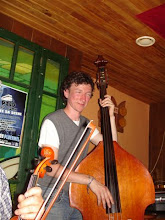
(picture of the film - Tarr Béla)
Sátántango is a humanistic look on the end of Hungarian communism. Cows are the first to open the ball, a dance that everyone has to dance, a unity of destiny inscribed in those grey times. Mud, heavy rain, plaster falling from the walls. The feeling of waiting is heavily but carefully transcribed for the screen, for the audience's experience. Carefully we drive away from the history of transition back into the poetics of change, the subtlety of relations and the weight of surveillance, the influence it has to shape people's roles, responsibilities and choices.
Tarr paints human islands with the flat lands of central Hungary as main background. This landscape which bares scars washed away by the violent continental rain: the rain its own scar. The metaphor of the watchful neighbour (the "doc") is a beautifully serious picture of the declining Hungarian state: one feeding on pálinká and morphine for work, archives for imagination and cigarettes for history, one painter, consumer and police of its own environment.
doc stumbles towards his shelves
slow and fat like an urban shop-queue
from there he whisks out two files
two drawings to reconstitute
his front window
doc continues to draw on the three sheets of paper
one empty of its actors, subject of his writing
two minutes ago; the one went to pee
the other ran out, having cheated on the peeing man's wife
he draws wires, walls and windows
doc has no more bones to show,
he is filling himself like a flooded river
a body dry from the inside
whose taps are full and cannot weep.
They follow the wind, loose paper.
The sound of Tarr's tango is not the sound of tragedy it is the sound of happening, and its proximity to its subjects, also its pace, give it a pronounced echo of the present, an imagined village theater where there is no lake Balaton to cry in, just the puddle and puzzle of a declining collective.
egység (or unity) is the key refrain of this world, the key to its tragic value, a key for no door, a key for a plain where the eastern wind is blowing and farm animals call for food.


No comments:
Post a Comment